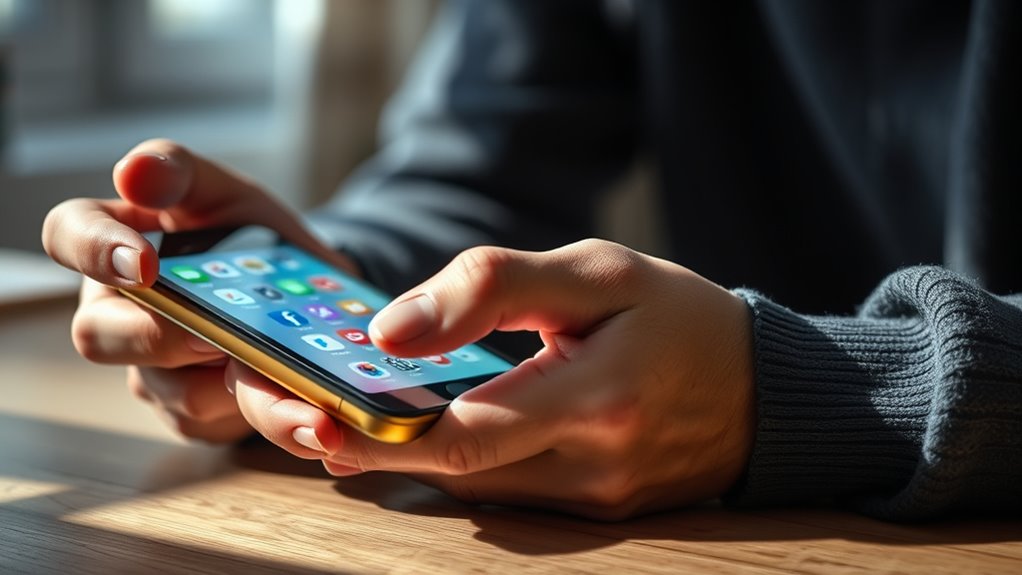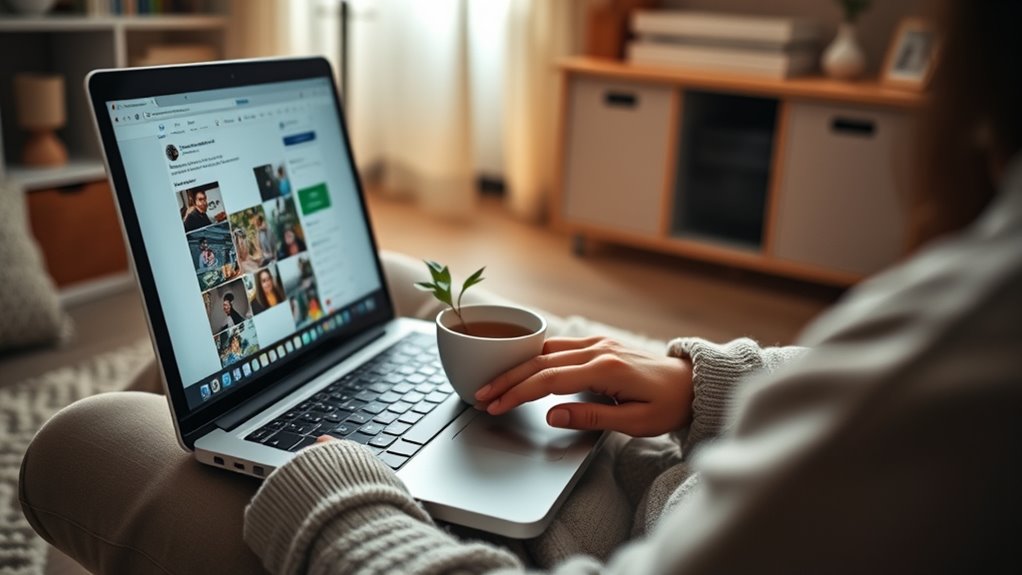To set healthy boundaries with social media and reduce anxiety, start by establishing specific times for online activity and use app timers to monitor your usage. Turn off notifications and create tech-free zones in your home. Practice mindful scrolling by paying attention to how content affects your mood, and schedule regular digital detoxes to reset your mental state. Focusing on offline activities and fostering positive online interactions can also enhance your well-being—find out more to strengthen your digital boundaries.
Key Takeaways
- Create designated offline times and tech-free zones to reduce overexposure and mental overload.
- Turn off non-essential notifications to minimize interruptions and emotional triggers.
- Set daily social media time limits and monitor usage with apps to prevent excessive engagement.
- Practice mindful scrolling by paying attention to emotional reactions and pausing when stressed.
- Regularly reassess your social media habits to ensure they support mental well-being and prevent burnout.
Recognizing the Impact of Social Media on Mental Health

Social media has become an integral part of daily life, but it also profoundly affects mental health, often in ways that are hard to recognize. You might notice emotional triggers arise suddenly, like feelings of inadequacy or jealousy after scrolling through others’ posts. These reactions can subtly chip away at your confidence, even if you don’t realize it. Privacy concerns also play a role; sharing personal details can lead to anxiety about who sees your information or how it’s used. Recognizing these impacts helps you understand how social media influences your mental well-being. By paying attention to emotional responses and privacy worries, you become more aware of how your online habits may be contributing to stress or anxiety, empowering you to set healthier boundaries. One way to manage this is by practicing asset division strategies that promote healthier online boundaries and protect your mental health.
Signs That Your Social Media Use Is Affecting Your Well-Being

You may start to notice your mood fluctuating unexpectedly or feeling more anxious after spending time online, which can be a clear sign that your social media habits are affecting your well-being. Digital overload often leaves you feeling drained and overwhelmed, making it hard to focus or relax. If you find yourself craving constant online validation, it’s a sign that your self-esteem relies heavily on others’ approval, increasing anxiety. You might also experience irritability or a sense of loneliness despite being connected. These feelings indicate that your social media use is taking a toll on your mental health. Recognizing these signs early helps you understand when your habits become unhealthy and prepares you to take steps toward healthier boundaries. Additionally, feeling the need for continuous reassurance can lead to a dependency on online validation, further impacting your emotional stability. Setting healthy boundaries around your social media usage can help protect your emotional well-being and foster a healthier relationship with technology. Becoming aware of how Digital overload affects your mental state can empower you to make more mindful choices about your online activity. Developing awareness of mental health signs related to social media can also aid in early intervention and better self-care practices.
Strategies for Setting Boundaries and Limiting Screen Time

Recognizing the signs that your social media habits are affecting your well-being is the first step toward establishing healthier boundaries. To do this, create designated tech free zones in your home, like the dining area or bedroom, where devices are off-limits. Manage notifications by turning off non-essential alerts to reduce constant interruptions and anxiety. Set specific time limits for social media use each day, and stick to them. Use apps or device settings to monitor your screen time and hold yourself accountable. Additionally, understanding the advancements in AI technology can help you identify tools that support healthier digital habits. Paying attention to patterns in your usage can further enhance your awareness of recurring digital behaviors that may be contributing to stress. Developing an awareness of digital well-being features on your devices can further support your efforts to create balanced social media usage. Incorporating features like screen time tracking can give you insights into your habits and help you stay within healthy limits.
Cultivating Mindful Engagement and Digital Detoxes

Practicing mindful engagement with social media involves being intentional about how and when you interact online. Focus on mindful scrolling by paying attention to your feelings and reactions as you browse, rather than mindlessly clicking through feeds. Recognize when your browsing becomes unproductive or causes stress, and take steps to pause. Incorporating regular digital detoxes helps reset your mind and reduces anxiety. Set specific times to disconnect completely, allowing yourself space away from notifications and screens. During detoxes, engage in activities that nourish your well-being, like exercise or reading. Being aware of the cyber threat landscape and evolving risks can help you stay protected and make informed choices about your online habits. Staying informed about online security can further empower you to guard your personal information effectively. Additionally, understanding how tuning modifications can improve your vehicle’s performance encourages mindful decision-making when customizing your car. Developing a better understanding of skincare products and their ingredients can also contribute to healthier habits and reduce the stress associated with skincare choices. Incorporating knowledge about fraud detection techniques and applying them to your online activities can help you recognize potential threats more effectively. By actively choosing when and how you engage, you foster a healthier relationship with social media, reducing its negative impact and creating more mental clarity and peace.
Building a Supportive Online Environment

Creating a supportive online environment involves curating your social media interactions to foster positivity and connection. Focus on engaging with content that uplifts and inspires you, and unfollow or mute accounts that promote negativity or comparison. Practice digital empathy by showing understanding and kindness in your comments and messages, which encourages others to do the same. Surround yourself with online communities that share your values and interests, creating a sense of belonging. Remember, your online space reflects your intentions—choose interactions that promote support and encouragement. Being mindful of relationship dynamics and how they influence your interactions can further enhance your online experience. Recognizing color protection strategies in your social media habits can help you maintain a healthier digital environment. Additionally, understanding social media algorithms can assist in tailoring your feed to prioritize positive content. Developing awareness of mindful engagement can help you navigate online spaces more consciously, reducing emotional exhaustion. Incorporating space optimization principles from home improvement can also remind you to maintain a clutter-free digital environment that fosters calm and clarity. By prioritizing online positivity and practicing digital empathy, you help create a healthier digital environment for yourself and others, reducing anxiety and fostering genuine connections.
Maintaining Balance for Long-Term Mental Wellness

Maintaining a healthy balance on social media is key to supporting your long-term mental wellness. Setting clear digital boundaries helps prevent burnout and reduces anxiety caused by constant engagement. Decide on specific times to check your accounts and stick to them, avoiding mindless scrolling. Incorporate self-care routines that prioritize offline activities, like exercise, reading, or spending time with loved ones. These routines reinforce your mental resilience and help you disconnect when needed. Regularly reassess your social media habits to ensure they serve your well-being, not hinder it. Remember, maintaining balance isn’t about avoidance but about mindful interaction. By establishing boundaries and nurturing self-care, you support your mental health and foster a sustainable, positive relationship with social media over time. Additionally, understanding the impact of digital boundaries can empower you to create a healthier online environment that promotes long-term mental wellness.
Frequently Asked Questions
How Can I Stop Comparing Myself to Others on Social Media?
To stop comparing yourself to others, focus on boosting your self-esteem and practicing mindful scrolling. Remind yourself that social media often shows curated highlights, not real life. Limit your time online and take breaks when needed. Focus on your achievements and strengths instead of others’ posts. By staying mindful during your social media use, you can reduce comparison and foster a healthier, more positive outlook on yourself.
What Are Simple Ways to Reduce Social Media Anxiety Daily?
To reduce social media anxiety daily, start with mindfulness practices like deep breathing or meditation to stay present. Limit your screen time by scheduling digital detoxes, such as device-free evenings or breaks. Unfollow accounts that cause stress and focus on content that uplifts you. Regularly disconnect to recharge mentally, making social media a positive tool rather than a source of anxiety. These simple habits can make a big difference in your well-being.
How Do I Handle Peer Pressure to Stay Constantly Connected?
Imagine you’re a lighthouse keeper, guiding ships safely without burning out. Peer pressure to stay constantly connected is like stormy seas tempting you to stay active. To handle this, schedule a digital detox and practice time management, setting clear boundaries. Remind yourself that disconnecting is essential for your well-being. You control the light—your online presence—so shine brightly without feeling pressured to stay lit 24/7.
Can Social Media Detoxes Improve My Mental Health?
A social media detox can definitely boost your mental health. By taking a break, you reduce exposure to constant notifications and privacy concerns, helping you regain control. Practicing digital minimalism encourages mindful usage, which lowers anxiety and stress. During the detox, you’ll likely notice improved focus, better sleep, and a stronger sense of well-being. It’s a simple step toward creating healthier habits and protecting your mental space.
How Do I Communicate My Boundaries Effectively to Friends Online?
Imagine you’re holding a fragile glass that represents your peace of mind. To protect it, you need clear digital boundaries. When talking to friends online, use assertive communication—be direct and respectful. Say, “I need some offline time,” or “I can’t reply right now.” Being honest helps set expectations without guilt, ensuring your mental health stays strong while maintaining your friendships. Your boundaries are your shield—keep them firm and clear.
Conclusion
Think of your social media habits as a garden. With careful tending and clear boundaries, you prevent weeds of anxiety from overtaking your mental space. By nurturing mindful engagement and taking digital detox breaks, you cultivate a healthy, vibrant environment. Remember, you’re the gardener of your well-being—choose what to nurture and when to step back. With balanced care, your mental garden will flourish, offering peace and clarity in the digital age.









